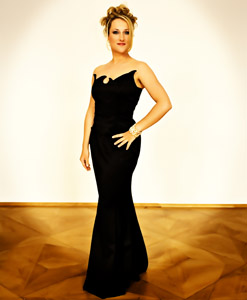Diana Damrau, the effervescent coloratura soprano who made her San Francisco Opera debut in the title role of The Daughter of the Regiment this season, met with Paul Duclos for a brief interview shortly before her final performance.

Photo by John Palmer
By Paul Duclos
Published: December, 2009
Duclos: What do you find as the most challenging aspect of playing this role?
Damrou: Playing Marie is pure physicality. Always when you do a different role, you have to get it into your voice, but this is more like a workout—hopefully with some nice singing in it. It’s hard to run and jump, and during the rehearsals, I had to stop. I could sing, but could not breathe it. Condition-wise, I needed some cardio training for the duet, and because the production already existed, I did not have six weeks to get through it—only half that time. In fact, the second orchestra rehearsal was already the general rehearsal with a full audience.
Duclos: But you have recently played other physically demanding roles, haven’t you?
Damrau: Well, yes and no. Playing Lucia was hard because of the up and down arias and vocal hill-climbing. But not like this. Here, I am really moving and lifting and acting like a 15-year-old girl.
Duclos: And a lot of that has to do with the production, yes?
Damrau: Absolutely! In [Director] Laurent Pelly’s view, the audience must be completely convinced that this young woman is completely green, yet capable of falling deeply in love. And in love not just with Tonio, but also her 500 regimental daddies, and the family that is trying to reclaim her, too. It’s not such a simple story.
Duclos: Still, you seem most in love in scenes with Tonio.
Damrau: Well, yes. But he’s the one doing most of the difficult singing. I don’t have the show stopper, Juan Diego [Florez] does! So I must do my part to keep the lyric at its most tender. And for that, I must appear to love everyone.
Duclos: And the conducting seemed to reflect that as well.
Damrau: Yes, Andriy [Yurkevich] has a Russian soul, and works with such passion. And not just as a leader. He is a superb musician who really understands the complexity of this opera. It is light, but not so light. Comic, yes, but also heavy at times. He knows this. Because if there is something we all want to avoid, it is that it becomes a joke—a bad joke.
Duclos: How else did you prepare for this role?
Damrau: By watching all the DVDs I could get my hands on, and seeing how other sopranos approached this role. Beverly Sills was magnificent. But I also wanted to make the role my own, to put my stamp on it, and really get beneath the surface. It’s not such an easy thing, you know.
Duclos: So that it becomes, perhaps, a signature role?
Damrau: That would not be so bad, but really, I want to do more Lucia, and then La Traviata. That is my goal now.
Duclos: Meanwhile, you must perform this again at the Met and begin getting ready for Manon at the Vienna State Opera.
Damrau: Yes, and then Ophélie in Hamlet at the Washington Opera and Donna Anna in Don Giovanni in Geneva. A great deal of studying. But that’s what I love to do. Study and sing, and come back to perform in San Francisco. You have a great company here, with a very devoted audience. They are educated, you know? They only laugh when things are funny. Not like in some other houses.
Duclos: Finally, tell us about part of the physical regimen that might surprise some of our readers. I understand you are also studying Flamenco.
Damrau: Yes, that is true. I try to find an instructor in every city I visit. Here in San Francisco, you have a very good one--Tania. But also in New York and Munich. And of course, anywhere in Spain. Will it mean that I will one day use this for opera? No. But it keeps me from getting too relaxed. And it keeps me fit, which is important when one travels so much.

